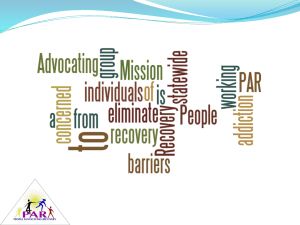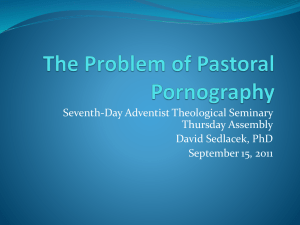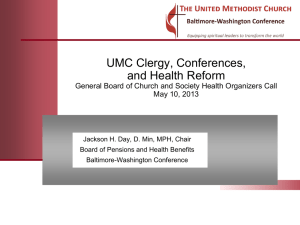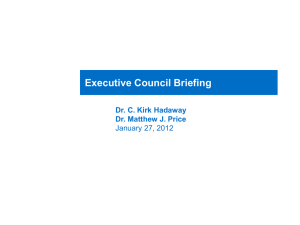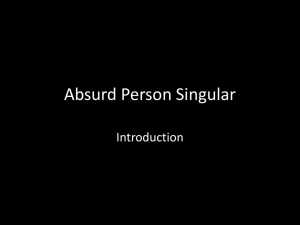Families and Recovery - Saint Francis Hospital
advertisement
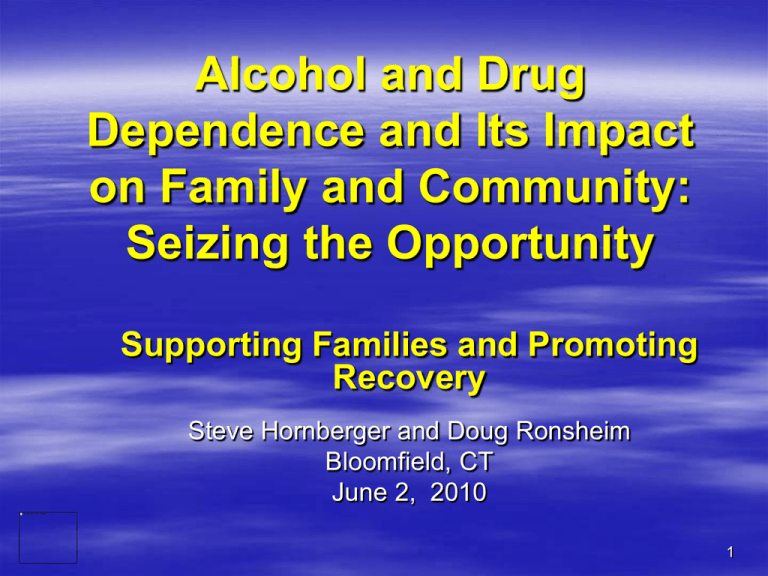
Alcohol and Drug Dependence and Its Impact on Family and Community: Seizing the Opportunity Supporting Families and Promoting Recovery Steve Hornberger and Doug Ronsheim Bloomfield, CT June 2, 2010 1 Supporting Families and Promoting Recovery Why in the Faith Community? 2 So Help Me God: Substance Abuse, Religion and Spirituality CASA’s Surveys of Clergy and Schools of Theology Presidents of 230 multi-denominational Christian seminaries and 6 Rabbinical Schools Sample of 1,200 clergy from New York, Florida, Iowa, Washington Denomination groups: Catholic, Protestant, Jewish, Christian, Orthodox, other (independent and non-denominational) 3 So Help Me God: Substance Abuse, Religion and Spirituality The Great Disconnects - Clergy’s recognition of problem of substance abuse in their congregations vs. lack of training on how to deal with it - Importance of spirituality and religion to substance abuse prevention and treatment vs. failure of healthcare providers to take advantage of this 4 So Help Me God: Substance Abuse, Religion and Spirituality The Clergy Disconnect - 94.4 percent of clergy and 97.6 percent of theology school presidents consider substance abuse an important problem in congregations - Only 12.5 percent of clergy get any substance abuse training 5 So Help Me God: Substance Abuse, Religion and Spirituality Engage the Clergy Schools of Theology should: ä Train clergy to recognize substance abuse and know how to respond Clergy should: ä Address substance abuse in their ministries ä Develop relationships with treatment professionals ä Connect members of congregations to treatment 6 The Clergy Education and Training Project ® Phase I – Seminary Training Expert Panel November, 2001 Phase II – Development of Core Competencies February, 2003 Phase III – Dissemination Step One: Release at CADCA, January 2004 Step Two: Publication of articles in journals Step Three: Incorporate into AAPC and ACPE credentials, standards, and training Step Four: Engaging the Faith Communities to help Step Five: Developing Seminary Curricula Modules Phase IV – Implementation of Clergy and Pastoral Minister Training – Pre- and Post- Ordination 7 Core Competencies for Clergy Guide to the core knowledge, attitudes, and skills essential to the ability of clergy and pastoral ministers to meet the needs of persons with alcohol or drug dependence and their family members Focus on: Addicted person Family system Affected children 8 Clergy Core Competencies 1. Be aware of the: – Generally accepted definition of alcohol and other drug dependence – Societal stigma attached to alcohol and other drug dependence 2. Be knowledgeable about the: – Signs of alcohol and drug dependence – Characteristics of withdrawal – Effects on the individual and the family – Characteristics of the stages of recovery 3. Be aware that possible indicator of the disease my include, among others: marital conflict, suicide, family violence (physical, emotional, and verbal), hospitalization , or encounters with criminal justice system. 9 Clergy Core Competencies 4. Understand that addiction erodes and blocks religious and spiritual development; and be able to effectively communicate the importance of spirituality and the practice of religion in recovery, using scripture, traditions, and rituals of the faith community. 5. Be aware of the potential benefits of early intervention to the: Addicted person Family system Affected children 6. Be aware of appropriate interactions with the: Addicted person Family system Affected children 10 Clergy Core Competencies 7. Be able to communicate and sustain: An appropriate level of concern Messages of hope and caring 8. Be familiar with and utilize available community resources to ensure continuum of care for the: Addicted person Family system Affected children 9. Have a general knowledge of and, where possible, exposure to: 12 Step Programs: AA, NA, Al-Anon, Nar-Anon, Alateen, ACOA, etc. Other groups 11 Clergy Core Competencies 10. Be able to acknowledge and address values, issues, and attitudes regarding alcohol and other drug use and dependence in: Oneself One’s Own Family 11. Be able to shape, form, and educate a caring congregation that welcomes and supports persons and families affected by alcohol and drug dependence. 12. Be aware of how prevention strategies can benefit the larger community. 12 AOD 101 – Basic Information To understand how to help congregants affected by alcohol and drug problems requires that we must understand the disease and its impact on family members. 13 Terminology Can Provide Hope or Deepen Misunderstanding and Shame Alcoholism Addiction Chemical Dependency Brain-Based Illness Substance Use Disorder “Substance Abuse” 14 Learning about addiction includes learning about its children 1 in 4 children under the age of 18 has a family member who abuses alcohol or has alcoholism. Countless others live with parental drug use. Addiction is a treatable disease, not a moral weakness, and living with it is emotionally and developmentally harmful to children. Clergy and other pastoral ministers can offer hope and help to addicted individuals and affected children and spouses in their congregations. 15 Why Include an Emphasis on the Children? Numbers are so great Chronic confusion, fear, stress, emotional and - sometimes - physical abuse Developmental and emotional impact from the toxic family environment Greater risk for neglect, for mental health problems, for addiction and for entering the juvenile justice system 16 Family interaction is defined by alcoholism or addiction. Problems clergy see that are frequently associated with addiction in the family: Increased… Family conflict Emotional or physical violence Family isolation Family stress, e.g.: work problems, illness, marital strain, finances, and frequent relocations Decreased… Family cohesion Family organization What Makes the Family Toxic? Don’t talk Don’t feel Don’t trust 18 Addicted Family Defense Mechanisms Delusion Denial Minimizing Projection Rationalization 19 A Parent who is abusing alcohol or other drugs May be less attentive to the child while drunk or high May be unable to fulfill their role as a parent, including providing medical treatment Is more likely to be diagnosed with a comorbid psychological problem 20 A Parent who is abusing alcohol or other drugs May be chronically physically ill from using drugs or alcohol Spends times procuring, using, and recovering from the alcohol or drug use instead of parenting May be engaged in illegal activities Places financial stress on the family system 21 Consequences for Children of Addicted Parents • More absenteeism from school, less help with homework • Daughters more likely to connect to/marry addicted men • More depression and suicide in adolescents • More illness, injuries, poisonings, substance abuse, hospitalizations 22 Children of Addicted Parents Often lack consistency, stability, and needed emotional support due to the chaotic family environment May be physically and emotionally traumatized by accidental injury or verbal, physical or sexual abuse due to parental drinking/drug use May encounter permissiveness, neglect, violence, poor communication, undersocialization 23 Adverse Child Experiences Study Death Early Death Disease, Disability and Social Problems Adoption of Health-risk Behaviors Scientific gaps Social, Emotional, & Cognitive Impairment Adverse Childhood Experiences Conception 24 Addressing Family Addiction Interventions need to be comprehensive and continual – and include ageappropriate child services. Children benefit from educational support programs, including Alateen, whether they live in birth home or in foster care, and whether or not their parents get well. Spouses benefit from Al-Anon 25 Recovery Does Happen Intervention and treatment work Families heal Spiritual health is possible again Money is saved Life gets better People in recovery give back Everyone wins! 26 Emerging Recovery Trends Recovery from alcohol and drug problems is a process of change through which an individual achieves abstinence and improved health, wellness, and quality of life. Recovery-Oriented Systems of Care shift the question from “How do we get the client into treatment?” to “How do we support the process of recovery within the person’s environment?” 27 Definition of Addiction in Relationship to God Addiction is a systemic de-construction that estranges, alienates and sedates the self-in-relation toward the Ultimate with outcomes of disenchantment and loss of meaning for life-experiences. Paraphrased from James E. Royce, S..J., Ph.D. The Effects of Alcoholism and Recovery, 1995 from Spirituality and Chemical Dependency 28 Long term effects within family system: applications to spiritual development. (McIvyn C. Raider, Ph.D. –1992, Assessing the role of religion in Family Functioning) Tangled relationships – “God” as the image of mom or dad – Co-dependent behaviors – Poor self-image Instability of religious commitment – Underdeveloped intrinsic values – Overcompensated with rigid behaviors or beliefs – Under-utilization of religious formation and support systems – Inconsistent modeling and mentoring for children 29 COAs Need Spiritual Help “I don’t know if I can ever forgive him …” COAs must learn to walk the path of progress, not perfection. – Support by clergy and faith–community for family therapy or individual counseling – Spiritual direction and mentoring The journey of forgiveness is not made in one’s feelings but in one’s surrender to faith. One day at a time … 30 COAs Need Spiritual Help (cont.) COAs need to appreciate their goodness and individual gifts. “We cannot forget but we can know where we want to be and always seek out new, fresh, holy ground as a restless pilgrim. We may not want to go home – but we can build a new house and make it our home.” Spiritual maxim (Ronald Rolheiser 2001: Against an Infinite Horizon) 31 Small Efforts Can Help Deliver the messages that break the silence – In sermons – In “Did You Know” Factoids – In casual conversations – In your congregational education programs – In your youth programs – In your pamphlet racks and with posters 32 Affected Spouses and Children Need a Framework for What They are Experiencing - Information about addiction as a family disease - Information about the hope of treatment and the process of recovery - Information on community-based supports such as Al-Anon and Alateen - Validation of their experiences - Reassurance that affected children and spouses need and deserve support and help…whether or not the addicted family member recovers 33 Addicted Families Need Clergy To Break the Family “no talk” rule: – Use “teachable moments” in sermons to inform about the disease and invite hurting congregants to healing. – Include addiction and family impact information in your educational programs. – Leave 12-Step literature in your materials racks – Leave this project’s free pamphlets in your counseling offices and youth centers for children and teens; hang project poster. – Remember: doing nothing and saying nothing is not neutral. 34 Talking Helps to Break the Silence Talk TO the children of alcoholics and drug addicts and talk ABOUT them; explain the disease and 7 Cs I didn’t Cause it I can’t Cure it I can’t Control it I can take better Care of myself: by Communicating my feelings making healthy Choices by Celebrating myself. 35 Other Messages Children Need You’re Not Alone. It’s Not Your Fault. You deserve help, and there are safe people who can help you. Addiction is a health problem. It’s OK to feel our feelings. It’s important to talk. Treatment helps, and recovery happens. 36 There are Many Message Delivery Systems Health Care Systems Treatment Systems FAITH COMMUNITIES Courts Community Coalitions Schools Workplace Programs Knowledgeable and caring family members 37 Help for the Children There is great value in educational support group activities – – Provide beneficial education for all children and youth – Especially helpful for children living with alcoholism or drug dependence in the family A tool to help: SAMHSA’s Children’s Program Kit 38 Group Work is the Preferred Strategy Because: Kids learn they are not alone. Group work increases the likelihood of breaking denial. Group work provides safety and protection. Kids experience healthy social interactions. Group work builds trust in social situations. Group work provides opportunities for group validation. Group work allows kids to try out new approaches to old problems. 39 COA Groups Let them know they are not alone! Validate their perceptions and interpretations Help them gain some perspective Absolve them of blame Help them separate parent from parental behavior Offer hope, self-care skills and help to cope Provide a safe outlet for anger Explain risks of behavior, and how to identify safe people in their lives Help build self-esteem 40 What happens if adults don’t help? Children are at greater risk for: Physical, verbal or emotional abuse Poor school performance Lacking of trust in others, including God Diminished spiritual life Truancy or trouble with the law Poor choice of life partners Diminished economic opportunities 41 Clergy Need to Understand Family Intervention Engages the most significant people in the addicted person’s life to: – present a loving, structured, supportive and coherent message of concern to an addicted loved one; – convince the person that alcohol/drug use is creating painful problems for all involved; – request that the person get help so that all can recover and heal. 42 Family Intervention Is... Carefully pre-planned Facilitated by a professional interventionist Includes key family members – spouses, children, and other significant persons Uses loving, supportive language Includes “What if…?” bottom lines Would seldom include clergy or other pastoral ministers 43 The Vision A faith community environment where all members of a family affected by addiction know there are knowledgeable and caring clergy and other pastoral ministers who: – understand what they are experiencing – care about them and are available to them – can help them find emotional and physical safety and – can support their healing and spiritual growth 44 To Contact Us: National Association for Children of Alcoholics www.nacoa.org Steve Hornberger shornberger@nacoa.org American Association of Pastoral Counselors www.aapc.org Doug Ronsheim doug@aapc.org 45
